Trump may have backtracked, but this is far from over

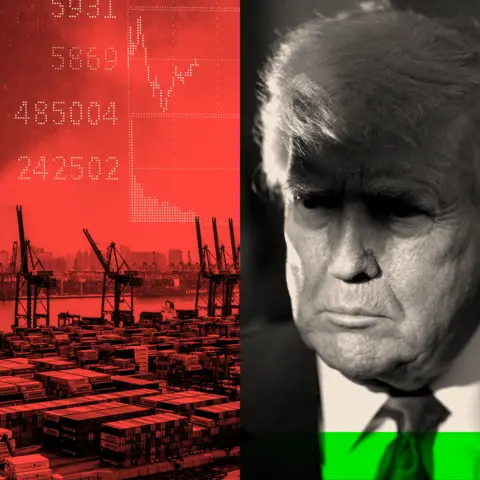 BBC
BBCThere were some heroic efforts from Donald Trump and those around him on Wednesday night to suggest the past seven days were something other than absolute chaos.
By this reading, Trump's 4D game of chess has left China in check. Certainly the Chinese economy faces a massive hit from punitive tariffs in its biggest market. But even accounting for the President's roll back, the US has still erected a massive protectionist tariff wall, not seen since the 1930s.
The world is left with a universal 10% tariff, irrespective of whether that country (for example the UK or Australia) actually sells less to the US than the US sells to it.
There is now no difference between the EU, which clearly does have a massive trade deficit in goods and was preparing to retaliate, and the UK.
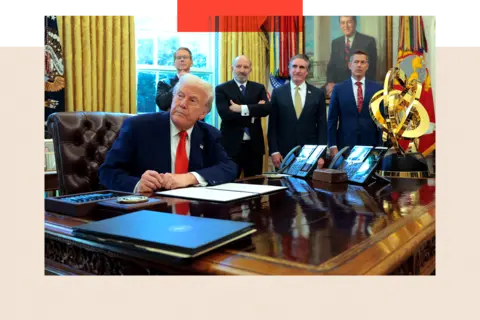 Getty Images
Getty ImagesThere is also an anxious wait to find out what comes next. One of the questions is whether President Trump pushes ahead with tariffs on medicines, the UK's second biggest goods export.
Plus there is potential logistical chaos on the cards from a little-noticed multi-million dollar port tax for every cargo vessel docking in the US that was "made in China". That is more than half of the global merchant fleet - and it is due next week.
Even with Trump's stated 90 day pause on implementing higher tariffs, there remains too much uncertainty for companies to go through the rigmarole of rerouting global trade.
The China fallout
The central issue now, however, is that the world's two great economic superpowers are facing off against each other like rutting stags.
Tariffs at these sky-high rates are massively hitting business between two nations which together account for around 3% of the entire world's trade. The main motorway of the global economy is effectively shut.
The visible tangible consequences of all this will become very real very quickly: Chinese factories will close, workers will stroll from plant to plant looking for work.
Beijing will need to organise a stimulus package to account for the loss of whole percentage points of GDP, the kind of thing that happens when a natural disaster flattens a major city. Painful, but manageable at a cost, though not forever.
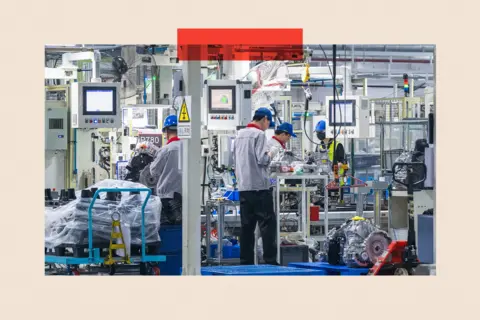 Getty Images
Getty ImagesMeanwhile the US will see consumer prices surge. President Trump might try to order these US companies not to raise prices, but the effect will come through soon enough.
In theory this will be in sharp contrast to what is happening in other countries in the world. Across the border in Canada, or in Europe, not only will there not be such China-sourced price rises, there could be price cuts.
From trade wars to currency wars
Trade wars on this scale do not stay confined to the flow of goods. They tend to become currency wars.
What we saw this week was the trade turmoil spread to credit markets, especially the US bond market, having already hit share prices.
Indeed there was an invaluable reveal for the game theory of this conflict. The Trump administration revealed a key pressure point with its concern about the "yippy" - as Trump called it - bond market.
As trading in US government debt continued overnight in Asia, the effective interest rate on these bonds rose to 5%.
This sort of borrowing should not move in such an erratic fashion.
The last time this happened was in the "Dash for Cash", the key moment of financial fragility at the very beginning of the pandemic. The world was focussed on life or death in March 2020, but this potential further crisis was alleviated only by emergency action.
Effectively, the President's row back was a form of emergency policy change.
Was the Chinese government behind this rash of US government bond sales in Asia? Probably not. However, what happened on Wednesday highlighted a vulnerability for Trump.
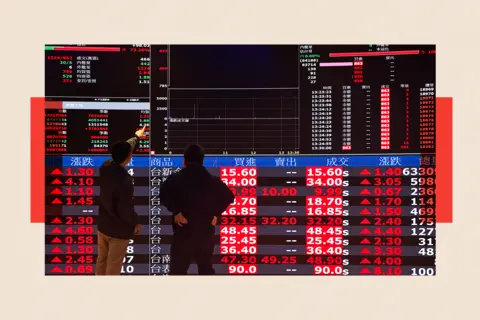 Getty Images
Getty ImagesChina is the second biggest holder of US government debt in the world and if it chose to, dumping all that debt would be catastrophic for America. But doing so would be a form of mutually assured economic destruction - the losses for China would be huge.
More importantly, what the bond markets were telling Trump is that they are deeply sceptical about his tariff policy.
The US does have the Federal Reserve, which does have some power to tranquillise bond markets. But right now it does not look like its chairman Jerome Powell will ride to the rescue.
The bond market scepticism echoes the sentiment of the ascendant Treasury Secretary Scott Bessent. He is now pushing for Trump to reach trade deals with their allies because the US needs them to take on China.
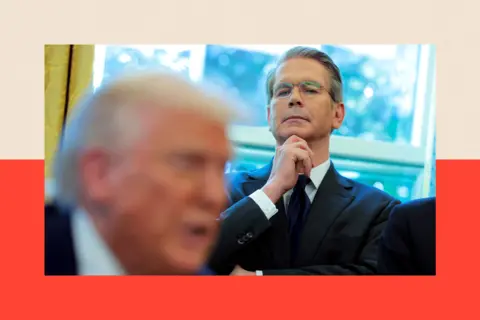 Getty Images
Getty ImagesGiven the US was previously calling these same close allies cheaters, looters and pillagers, there is no way this was the strategy all along.
This does matter. The US needs the EU, UK, the rest of the G7 on side in terms of China. China probably needs those countries just to stay neutral, and carry on soaking up its exports.
The rest of the world has seen Trump's team struggle to explain tariffing penguin islands or poor African economies and the President himself recirculating the suggestion he was crashing stock markets on purpose. And they've witnessed the fact that the tariff rates were changed after they came into effect and also the absurd nature of the equation used to calculate them.
It's in this context that Trump's handling of the situation has handed leverage back to the rest of the world, because neither friend nor foe will know quite what they are negotiating with this America.
There is a calm, welcomed by all, but it could be rather brief.
BBC InDepth is the home on the website and app for the best analysis, with fresh perspectives that challenge assumptions and deep reporting on the biggest issues of the day. And we showcase thought-provoking content from across BBC Sounds and iPlayer too. You can send us your feedback on the InDepth section by clicking on the button below.
